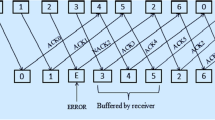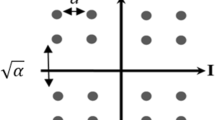Abstract
Incremental redundancy hybrid automatic repeat request (IR HARQ) has been extensively studied for reliable data transmission over slow-fading or quasi-static channels. With the increase in movement speed of users and the use of long code words for data transmission, IR HARQ strategy in fast-fading channels is starting to attract attention in the academia. This paper studies the performance of the IR HARQ strategy based on Kite codes (a class of rateless codes) in the finite regime over fast-fading channels where a number of channel realizations are experienced in each retransmission round. We propose an algorithm that exploits current decoding reliability to determine the size of subsequent retransmissions. Long-term throughput and delay constraint throughput are analyzed and compared. Furthermore, in HARQ systems available, most of the computation power is consumed on failed decoding if a code word is retransmitted many times, which is not energy-efficient. Therefore, to improve the energy efficiency, we propose two efficient algorithms (early stopping algorithm and freezing node algorithm) for incremental decoding, which reduce the computational complexity of the most time-consuming steps in decoding procedure. Simulation results show that the substantial complexity reduction is achieved in terms of the total required number of decoding iterations and the required node operation complexity compared to conventional incremental decoding scheme.














Similar content being viewed by others
References
Makki B, Eriksson T (2012) On the average rate of HARQ-based quasi-static spectrum sharing networks. IEEE Trans Inform Theory 11:65–77
Shen C, Liu T, Fitz MP (2009) On the average rate performance of hybrid-ARQ in quasi-static fading channels. IEEE Trans Commun 57:3339–3352
Tuninetti D (2011) On the benefits of partial channel state information for repetition protocols in block fading channels. IEEE Trans Inform Theory 57:5036–5053
Ha J, Kim J, McLaughlin SW (2004) Rate-compatible puncturing of low-density parity-check codes. IEEE Trans Inform Theory 50:2824–2836
Yazdani M, Banihashemi A (2004) On construction of rate-compatible low-density parity-check codes. In: Proceedings of IEEE international conference on communications, vol 1. pp 430–434
Hsu CH, Anastasopoulos A (2008) Capacity achieving LDPC codes through puncturing. IEEE Trans Inform Theory 54:4698–4706
El-Khamy M, Hou J, Bhushan N (2009) Design of rate-compatible structured LDPC codes for hybrid ARQ applications. IEEE J Sel Area Commun 27:965–973
Kim J, Ramamoorthy A, Mclaughlin S (2009) The design of efficiently-encodable rate-compatible LDPC codes. IEEE Trans Commun 57:365–375
Vellambi BN, Fekri F (2009) Finite-length rate-compatible LDPC codes: a novel puncturing scheme. IEEE Trans Commun 57:297–301
Dammer U, Naroska E, Schmermbeck S et al (2004) A data puncturing IR-scheme for type-II hybrid ARQ protocols using LDPC codes. IEEE Global Telecommun Conf 5:3012–3016
Sesia S, Caire G, Vivier G (2004) Incremental redundancy hybrid ARQ schemes based on low-density parity-check codes. IEEE Trans Commun 52:1311–1321
Hagenauer J (1988) Rate-compatible punctured convolutional codes (RCPC codes) and their applications. IEEE Trans Commun 36:389–400
Kallel S (1995) Complementary punctured convolutional (CPC) codes and their applications. IEEE Trans Commun 43:2005–2009
Arslan SS (2014) Incremental redundancy, fountain codes and advanced topics. arXiv:1402.6016
Soljanin E, Varnica N, Whiting P (2005) Incremental redundancy hybrid ARQ with LDPC and raptor codes. IEEE Trans Inform Theory. http://citeseerx.ist.psu.edu/viewdoc/download?doi=10.1.1.318.4436&rep=rep1&type=pdf
Heo J, Kim S, Kim J et al (2008) Low complexity decoding for Raptor codes for hybrid-ARQ systems. IEEE Trans Consum Electron 54:390–395
Luby M (2002) LT codes. In: Proceedings of the 43rd symposium on foundations of computer science. Vancouver, BC, pp 271–280
Shokrollahi A (2006) Raptor codes. IEEE Trans Inform Theory 52:2551–2567
Palanki R, Yedidia JS (2004) Rateless codes on noisy channels. In: Proceedings of international symposium on information theory (ISIT). Chicago, IL, p 37
Etesami O, Shokrollahi A (2006) Raptor codes on binary memoryless symmetric channels. IEEE Trans Inform Theory 52:2033–2051
Bonello N, Zhang R, Chen S et al (2009) Reconfigurable rateless codes. IEEE Trans Wirel Commun 8:5592–5600
Zhang K, Ma X, Zhao S et al (2012) A new ensemble of rate-compatible LDPC codes. In: Proceedings of IEEE international symposium on information theory proceedings (ISIT). Cambridge, MA, pp 2536–2540
Ma X, Zhang K, Bai BM et al (2011) Serial concatenation of RS codes with Kite codes: performance analysis, iterative decoding and design. http://arxiv.org/abs/1104.4927
Bai B, Bai BM, Ma X (2012) Simple rateless error-correcting codes for fading channels. Sci China Inf Sci 55:2194–2206
Zhu M, Wei Y, Bai BM et al (2013) Precoded Kite codes for the AWGN channel. In: Proceedings of IEEE international conference on wireless communications and signal processing (WCSP). Hangzhou, China, pp 1–6
Soljanin E, Varnica N, Whiting P (2006) Punctured vs rateless codes for hybrid ARQ. In: Proceedings of IEEE information theory workshop, Punta del Este, Uruguay, pp 155–159
Castura J, Mao Y, Draper S (2006) On rateless coding over fading channels with delay constraints. In: Proceedings of IEEE international symposium on information theory (ISIT). Seattle, WA, pp 1124–1128
Makki B, Graelli Amat A, Eriksson T (2012) On ARQ-based fast-fading channels. IEEE Commun Lett 16:1921–1924
Visotsky E, Sun Y, Tripathi V et al (2005) Reliability-based incremental redundancy with convolutional codes. IEEE Trans Commun 53:987–997
Pai HT, Han YS, Chu YJ (2011) New HARQ scheme based on decoding of tail-biting convolutional codes in IEEE 802.16 e. IEEE Trans Veh Technol 60:912–918
Fricke JC, Hoeher PA (2009) Reliability-based retransmission criteria for hybrid ARQ. IEEE Trans Commun 57:2181–2184
Uhlemann E, Rasmussen LK, Grant AJ et al (2003) Optimal incremental-redundancy strategy for type-II hybrid ARQ. In: Proceedings of IEEE international symposium on information theory (ISIT), Yokohama, p 448
Chen J, Dholakia A, Eleftheriou E et al (2005) Reduced-complexity decoding of LDPC codes. IEEE Trans Commun 53:1288–1299
Hu XY, Eleftheriou E, Arnold DM et al (2001) Efficient implementations of the sum-product algorithm for decoding LDPC codes. In: Proceedings of IEEE global telecommunications conference, San Antonio, TX, vol 2, pp 1036–1036E
Hu K, Castura J, Mao Y et al (2006) Reduced-complexity decoding of raptor codes over fading channels. In: Proceedings of IEEE global telecommunications conference, San Francisco, CA, pp 1–5
Hu K, Castura J, Mao Y (2007) Performance-complexity tradeoffs of Raptor codes over Gaussian channels. IEEE Commun Lett 11:343–345
Casado AIV, Griot M, Wesel RD (2007) Informed dynamic scheduling for belief-propagation decoding of LDPC codes. In: Proceedings of IEEE international conference on communications, Glasgow, Scotland, pp 932–937
Casado AIV, Griot M, Wesel RD et al (2010) LDPC decoders with informed dynamic scheduling. IEEE Trans Commun 58:3470–3479
AbdulHussein A, Oka A, Lampe L (2008) Decoding with early termination for Raptor codes. IEEE Commun Lett 12:444–446
Chen YM, Lee HC, Ueng YL et al (2012) Flooding-assisted informed dynamic scheduling for rateless codes. In: Proceedings of IEEE wireless communications and networking conference (WCNC), Shanghai, China, pp 173–177
Chen SL, Zhang ZY, Zhang L et al (2013) Belief Propagation with gradual edge removal for Raptor codes over AWGN channel. In: Proceedings of IEEE 24th international symposium on personal indoor and mobile radio communications (PIMRC), London, UK, pp 380–385
Tu K, Zhang ZY, Yao CM et al (2013) A Rateless encoder with adaptive symbol removal for AWGN and fading channels. In: Proceedings of IEEE international conference on wireless communications and signal processing (WCSP), Hangzhou, China, pp 1–6
Szczecinski L, Khosravirad SR, Duhamel P et al (2013) Rate allocation and adaptation for incremental redundancy truncated HARQ. IEEE Trans Commun 61:2580–2590
Makki B, Eriksson T (2010) On the average rate of quasi-static fading channels with ARQ and CSI feedback. IEEE Commun Lett 14:806–808
Elias P (1961) Channel capacity without coding. In: Baghdady EJ (ed) Lectures on Communication System Theory. McGraw-Hill, New York, pp 363–368
Chang S (1956) Theory of information feedback systems. IRE Trans Inform Theory 2:29–40
Chen TY, Seshadri N, Shen BZ (2010) Is feedback a performance equalizer of classic and modern codes? In: Proceedings of IEEE information theory and applications workshop (ITA), San Diego, CA, pp 1–5
Ryan W, Lin S (2009) Channel codes: classical and modern. Cambridge University Press, Cambridge
Acknowledgments
This work was supported in part by the National Basic Research Program of China (2012CB316100), the National Natural Science Foundation of China (61372074 and 61172082), and National Key Laboratory Foundation of China (9140C530401-120C53201).
Author information
Authors and Affiliations
Corresponding author
Additional information
SPECIAL TOPIC: Advances in Broadband Wireless Communications under High-Mobility Scenarios
About this article
Cite this article
Zhu, M., Bai, B., Dou, J. et al. Kite code-based incremental redundancy hybrid ARQ scheme for fast-fading channels. Chin. Sci. Bull. 59, 5029–5041 (2014). https://doi.org/10.1007/s11434-014-0630-x
Received:
Accepted:
Published:
Issue Date:
DOI: https://doi.org/10.1007/s11434-014-0630-x




